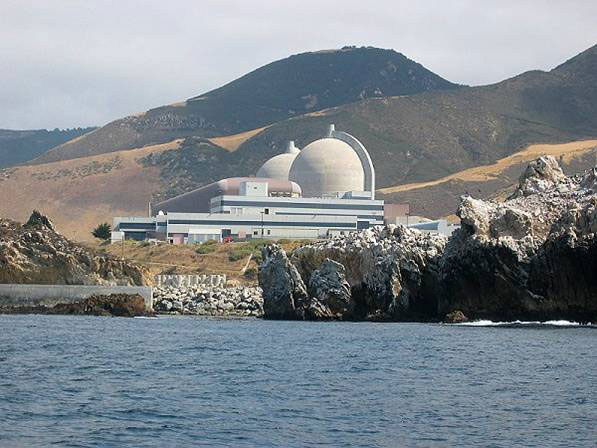$85-million agreement proposed to address impact of Diablo closure
PG&E, SLO County, SLO Coastal Unified School District, local cities reach accord
—Pacific Gas and Electric Company, labor and leading environmental groups, the County of San Luis Obispo, the Coalition of Cities (Arroyo Grande, Atascadero, Morro Bay, Paso Robles, Pismo Beach and San Luis Obispo) and the San Luis Coastal Unified School District have announced a proposed agreement that would provide $85 million in support for the San Luis Obispo County community. The proposed agreement was reached following a, “mutual goal to ensure a successful transition for the region over the next nine years to a post-Diablo Canyon operations economy.” The agreement fulfills a key element of the DCPP joint proposal that was announced over the summer.
“PG&E is privileged to be part of the Central Coast community,” said Geisha Williams, president, PG&E Electric. “We’ve been here for over a century and will continue to be an active community member for decades to come, working with local leaders to sustain a strong and diverse economy. We appreciate this opportunity to partner with our county, cities and other stakeholders on this important agreement, which will greatly assist in the planning and preparation for a future without Diablo Canyon in operation. This is an important issue for all of us, and PG&E will continue to strongly advocate for supporting our community as the joint proposal moves through the state’s review process.”
“PG&E is a valued community partner and its efforts to negotiate with us and address our major concerns related to the plant’s closure further confirms that PG&E cares about the future of our community,” said County Board Chair and District 4 Supervisor Lynn Compton.
“This groundbreaking agreement will soften the significant impact our community will feel once Diablo Canyon is no longer here,” said County Board Vice Chair and District Supervisor Adam Hill. “There is still a difficult road ahead, but if we continue to work together, we will shape a prosperous future for our community. This collaborative effort is something of which we can all be proud.”
About the agreement
The county served as the lead government agency for the local area in negotiating the overall agreement with PG&E.
Under the first part of the agreement between PG&E, the county and school district, a $75 million Essential Services Mitigation Fund will be created to offset the potential negative impacts to essential services provided to the community by the school district and the county. This will be distributed to the county in nine equal annual installments through 2025 and the county will redistribute the funds to local agencies whose budgets are impacted by the inevitable decrease in unitary tax funding from the power plant. The school district will receive the bulk of this funding.
Under a second part of the agreement between the county and the Coalition of Cities, PG&E would create a $10 million Economic Development Fund to ease the local economic impacts of the plant’s closure. Each member of the Coalition of Cities will receive a portion of $5.76 million, the county will receive $3.84 million, and the remaining $400,000 will be allocated for regional economic development activities. The county will be sharing a portion of the $3.84 million with the City of Grover Beach which means that all cities in the county will receive benefits from this settlement.
A third part of the agreement between PG&E and the county addresses the continuation of funding for offsite community and local emergency preparedness and planning efforts until all spent fuel is in dry cask storage and the two nuclear reactors are fully decommissioned. This part of the agreement also reiterates PG&E’s earlier pledge not to take actions or make decisions on the re-use or sale of DCPP-related lands, including Wild Cherry Canyon, until PG&E has completed a site-specific decommissioning plan with input from the community.
Respective local governing bodies will review their portions of the joint agreement during public meetings in December. All parties need to officially approve the agreement and submit it to the California Public Utilities Commission as a modification to PG&E’s original joint proposal. All elements of the joint proposal are subject to the CPUC’s review and approval.
California’s energy landscape is changing dramatically, according to PG&E. State policies that focus on renewables and energy efficiency, coupled with projected lower customer electricity demand in the future, will result in a significant reduction in the need for the electricity produced by Diablo Canyon past 2025.
Reflecting this change, PG&E partnered with labor and leading environmental organizations on a joint proposal that would increase investment in energy efficiency and renewables while retiring DCPP at the end of its current Nuclear Regulatory Commission (NRC) operating licenses, which expire in 2024 and 2025.
The parties to the joint proposal are PG&E, International Brotherhood of Electrical Workers Local 1245, Coalition of California Utility Employees, Friends of the Earth, Natural Resources Defense Council, Environment California and Alliance for Nuclear Responsibility.
The proposal includes a PG&E commitment to a 55-percent renewable energy target in 2031, an unprecedented voluntary commitment by a major U.S. energy company.
Recognizing that the procurement, construction and implementation of a greenhouse gas-free portfolio of energy efficiency and renewables will take years, the joint parties agreed to support PG&E in obtaining the state approvals needed to operate DCPP to the expiration of its current NRC operating licenses.
This avoided an early shutdown of DCPP and associated negative economic and social impacts, including replacing the plant’s output required to meet customer demand with non-greenhouse gas-free resources.
As part of the joint proposal, PG&E immediately ceased any efforts on its part to renew the DCPP operating licenses, and asked the NRC to suspend consideration of the pending DCPP license renewal application. PG&E will withdraw its license renewal application upon CPUC approval of the joint proposal application.
PG&E does not believe long-term customer rates will increase as a result of the joint proposal.
A key element of the joint proposal includes proposed payments by PG&E to the local region in support of a community transition plan. Additionally, PG&E’s proposed Diablo Canyon retention program will serve to support both local employees and the community. It provides incentives to retain employees during the remaining operating years of the plant, a retraining and development program to facilitate redeployment of a portion of plant personnel to the decommissioning project or other positions within the company, and severance payments upon the completion of employment.
By ensuring that the power plant’s skilled workforce remains in the area through financial incentives, not only will the plant continue to run safely and reliably, but the region will also be economically supported for years to come. These employee incentives will likely provide an unanticipated economic boost to cities to aid in their transition.
If the joint proposal is approved by the CPUC, the nine-year $520 million employee retention and severance programs will result in a significant local economic stimulus that could further aid cities in planning for a successful economic transition through additional and unanticipated tax revenue.
Re-training opportunities will also allow employees to learn new skills that could be used to support company operations locally, or the decommissioning of DCPP, helping ensure that employees remain in and continue to support the region.
In the years ahead, PG&E will develop a site-specific proposal on how to decommission Diablo Canyon. The decommissioning project is expected to be a multi-decade, multi-billion dollar effort, resulting in continued employment and economic spending in the community.
PG&E will also continue with its voluntary charitable support in the region.
The joint proposal can be read in its entirety here.
The Aug. 11, 2016, joint proposal application filed at the CPUC can be found here.
PG&E’s Sept. 26, 2016, response to public comments on the joint proposal can be read here.
Additional information prepared by M.J. Bradley & Associates, a strategic environmental consulting firm, on the joint proposal can be accessed here.












